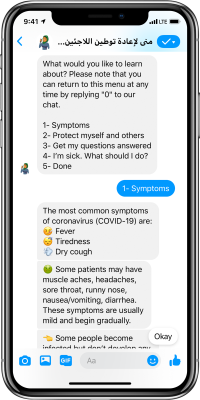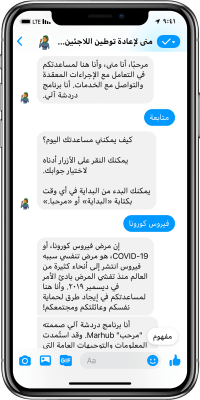Connecting Society’s Most Vulnerable with Reliable Information

When I was in graduate school at the University of California Berkeley, my classmate Peter Wasserman and I visited refugee settlements in Greece and Lebanon. People there were eager to meet us, assuming we were lawyers that might be able to help them. When we asked them if they had reached out to aid organizations for assistance, one refugee in Greece told us they had contacted 38 NGOs in Turkey for help but had not received one response. They then contacted a smuggler on social media who responded to them in minutes. This was where the idea was born for us to create Marhub International, an organization that helps refugees navigate fragmented services and complicated procedures by providing them with essential and reliable information. We use a chatbot called Mona on Messenger to reach refugees and help answer their questions and point them to the resources they need.
We understood immediately that at the core of the issues refugees faced was getting reliable information that could actually help them. We knew we needed a platform that displaced people might already be using to communicate which was why we chose Messenger. We also wanted a service that was conversational in nature so that we could communicate with people on their own terms, in their own languages, as well as provide immediate information which is critical to those in such a high stress and uncertain situation. Through the Mona chatbot, which was launched in partnership with the International Refugee Assistance Project (IRAP), refugees can navigate pathways to safety and connect with legal assistance. Mona refers relevant cases to IRAP for legal assistance and flags vulnerable cases to ensure a timely response. So far, almost 13,000 refugees have used Mona, primarily in Jordan, Lebanon and Turkey.
Now this refugee population is suddenly faced with more adversity as the spread of COVID-19 continues across the globe. As we brace for the worst in our own communities, we can’t ignore the devastating impact the coronavirus will have on the world’s most vulnerable; the 70 million people forced from their homes by persecution and violent conflict. Overcrowded living conditions and scarce soap and water make social distancing and even regular hand-washing impossible for millions of refugees. This is why Marhub International is now expanding the scope of the Mona Messenger chatbot to make accurate coronavirus information accessible to refugees and help counteract misinformation and empower refugees to protect themselves and stem the spread of the virus in their communities.


Through Mona, Marhub is rapidly deploying accurate, tailored information about coronavirus to help refugees protect themselves. The information, accessible in both English and Arabic through Messenger and Telegram, has been adapted from the World Health Organization (WHO) and the UN Refugee Agency (UNHCR), and has been vetted by doctors. In addition to general guidance on basic hygiene, prevention, and symptoms, Mona proactively addresses common questions and popular myths about the virus, and provides practical tips that are tailored to refugee communities. For example, Mona shares specific tips like avoiding shared water smoke pipes (shisha), what to do if you must stand in line for food or shared toilets, and what to do if you don’t have access to protective gear like masks. The tool also provides location-specific guidance on what to do if you get ill, and for those who are seriously ill, how to seek medical assistance in Lebanon, Jordan and Turkey. Finally, Mona shares external resources including case tracking websites for each country to help refugees stay informed about their local area.
Marhub International, along with Messenger, is uniquely positioned to respond rapidly to emerging information gaps created by the COVID-19 crisis. We remain committed to identifying opportunities to support public health efforts in refugee and forced migrant communities across the globe.
